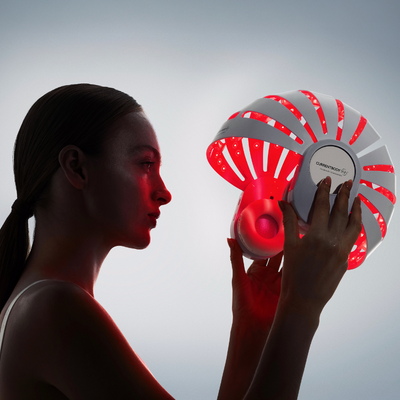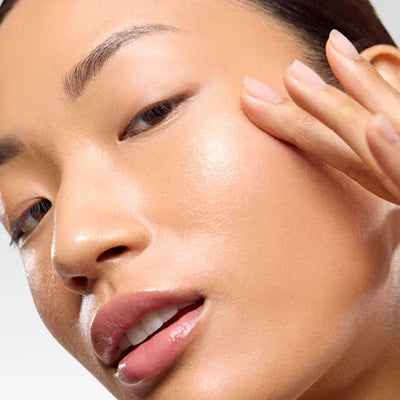Hair loss is an all too common concern affecting more than half the world’s population. With so many modern technological and topical solutions, it can be difficult to find the best treatment for you.
In recent years, light therapy devices have gained huge popularity, but the big question remains: laser vs LED for hair growth, which is better?
We spoke with certified trichologist and registered nurse, Celestine Gitau about the benefits of LED light therapy versus laser for the best clinical hair regrowth technology from home.
How does LED and laser light therapy treat hair regrowth?
Both technologies use the power of light coverage to stimulate cells, resulting in improved blood flow and scalp circulation while encouraging the delivery of essential nutrients directly to hair follicles.
The wavelengths play an important role in hair growth and the development of strong, healthy hair follicle cells. Although these light therapy technologies are similar, there are notable distinctions.
Laser therapy uses a single wavelength to focus a narrow beam of light directly to the scalp, treating a small area. Comparatively, LED light therapy uses one or more wavelengths to treat larger surface areas of the scalp with a broader band of light.
This means that LED light therapy has more coverage, activating a higher number of hair follicles per cm² compared to laser hair regrowth treatments.

Clearing up the confusion: Light vs laser terminology
It’s easy to see why people mix up LED light therapy and laser therapy, both are often shortened to LLLT. But while they share similar benefits, they’re not the same technology.
Here’s the main difference between the two:
-
Low-Level Light Therapy (LED): Uses light-emitting diodes (LEDs) to evenly cover large areas of the scalp, stimulating more hair follicles at once.
-
Low-Level Laser Therapy (Laser): Uses coherent, concentrated laser beams to penetrate more deeply but over a smaller, targeted area.
So while you may see LLLT used as a blanket term online, it’s worth remembering that LED and laser devices work differently, and your choice will affect your treatment coverage and convenience.
Comparison of low-level laser therapy vs LED for hair growth
As mentioned above, low-level laser therapy uses a focused, coherent beam of light (usually around 650nm) to stimulate hair follicles and extend the growth (anagen) phase of the hair cycle.
LED light therapy, on the other hand, uses multiple non-coherent light wavelengths, typically red (640nm) and near-infrared, to cover larger areas of the scalp in one treatment.
Here’s a quick comparison of laser vs LED hair growth treatments:
|
Feature |
Laser Therapy (LLLT) |
LED Light Therapy |
|
Light Source |
Coherent, focused beam |
Incoherent, scattered light |
|
Coverage |
Small, targeted area |
Wide, full scalp coverage |
|
Wavelengths |
Single (usually 650nm) |
Multiple (640nm, 680nm) |
|
Proven Benefits |
Clinically effective |
Clinically effective |
|
Comfort |
Pinpointed, sometimes warm |
Gentle, non-heating |
|
Best Use |
Pinpointed thinning patches |
General hair thinning or pattern loss |
|
Accessibility |
Often clinic-based |
Widely available for home use |
Laser vs red light therapy for hair growth
Another common question is whether “laser vs red light therapy” is really a comparison at all. The truth is: red light therapy can come from either a laser or LED device. What matters most is the wavelength (typically around 640–650nm), which penetrates the scalp to encourage circulation and stimulate follicle activity.
So instead of thinking “laser vs red light,” the better comparison is laser vs LED red light therapy. And for home users, LED devices deliver the same clinically proven wavelength. But with wider coverage and greater ease of use.

What is the best technology for hair regrowth?
LED therapy provides a comfortable, non-invasive treatment free from side effects, offering a safe and convenient solution to address hair loss. LLLT (low-level light therapy) is clinically proven to increase hair density in patients with pattern hair loss over a 16-week timeframe using a wearable, helmet-type device.
Now accessible for home use to sustain your 10-minute hands-free sessions, without interrupting your daily routine. The CurrentBody Skin LED Hair Growth Helmet has been clinically proven to increase hair count per cm² by +26.3% after just 16 weeks.
Simple, convenient, and FDA-cleared, the helmet offers revolutionary red light technology to reverse the effects of slow progressive pattern hair loss.
Consisting of 120 red LED light diodes and 2 head circumference options, this wearable technology ensures optimal full scalp coverage. Quick 10-minute daily sessions provide ample nutrients and oxygen to the scalp, leading to thicker hair, increased density and a prolonged growth phase.

With a clinically proven wavelength (640nm) at 18 J/cm² power, this device is 3 times stronger than the average laser strength. This provides different penetration depths and cellular enhancements, offering the most effective technology for hair loss at home in both men and women.
See the difference that just 16 weeks of 10-minute daily sessions of the CurrentBody Skin LED Hair Growth Helmet can do for your hair regrowth journey.
Find out more:





